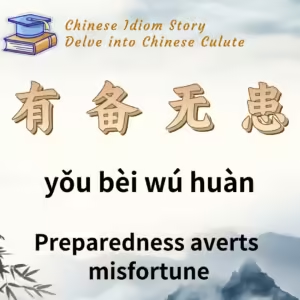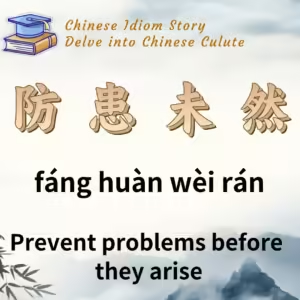
Chinese Idiom: 有备无患 (You Bei Wu Huan)
English Translation: Preparedness averts misfortune
pīn yīn: yǒu bèi wú huàn
Idiom Meaning: Being prepared in advance can help avoid foreseeable disasters or problems.
Historical Source: “The Zuo Tradition” (《左传·襄公十一年》)
Idiom Story:
During the Spring and Autumn period, Duke Dao of Jin became the overlord of the central plains. One year, eleven vassal states planned to unite and attack the small state of Zheng. Unable to withstand such a coalition, Zheng sought help from Jin. Duke Dao agreed, prompting the other states to halt their invasion.
To express gratitude for Jin’s assistance, Zheng sent numerous gifts, including chariots, musical instruments, musicians, and singers. The Duke intended to share these rewards with his minister Wei Jiang, who had played a crucial role in fostering peace with the nomadic tribes, thus stabilizing the central states.
However, Wei Jiang, a significant political figure in Jin, humbly declined the lavish gifts. Instead, he advised the Duke to consider the future: “Your Majesty, while I appreciate your generosity, it is essential to remember that in times of peace, we must remain vigilant against potential dangers. As stated in the Book of Documents, ‘In times of safety, think of danger; by thinking, one can be prepared; with preparedness, one can avoid disaster.'”
Duke Dao recognized Wei Jiang’s political foresight and praised his wisdom, insisting that he accept the gifts as a matter of state protocol. Reluctantly, Wei Jiang complied but remained focused on the need for preparedness in governance.
This story illustrates the wisdom of foresight and the importance of preparation to avert potential crises, encapsulated in the idiom “有备无患.”






